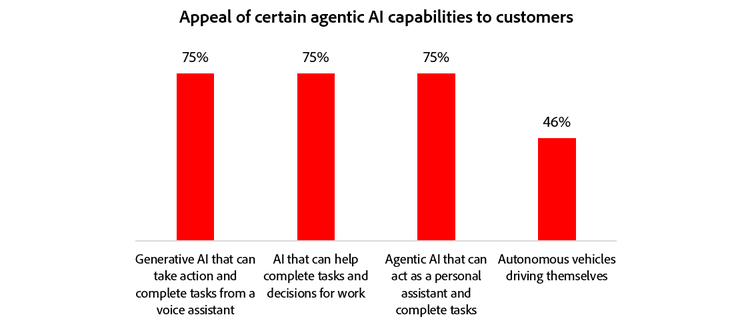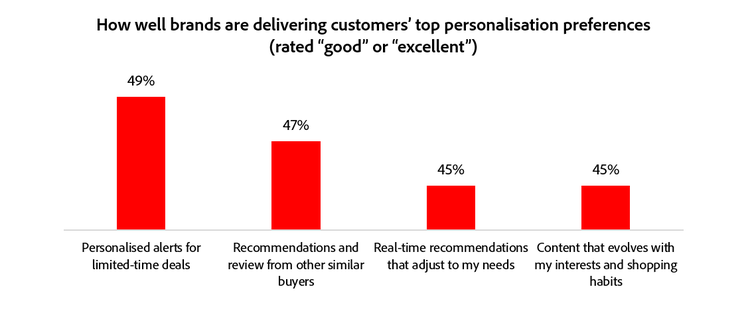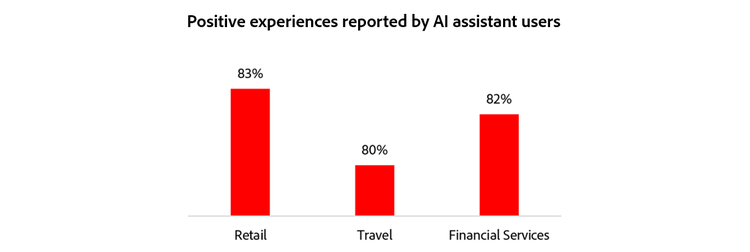AI Revolution: New Zealand consumers signal shift to personalised agentic experiences
August 11, 2025

NEW ZEALAND – August 11, 2025 – While New Zealand’s adoption of AI tools has been measured, consumers are signalling a readiness to accelerate their use as new AI services and capabilities emerge. More than half (61%) are increasingly using – or want to use – AI technologies in general, while 75% are excited about the potential of agentic AI specifically.
In a survey of 1,000 New Zealanders, Adobe explored consumers' usage and perceptions of AI – from AI assistants that can answer queries and perform requested tasks, through to emerging AI agents that can make decisions and act autonomously. The findings show that as people become more familiar with, and reliant on AI, they’re ready for the next wave of intuitive digital experiences with agentic AI.
According to the research, 62% of New Zealand consumers have used AI assistants more than once, which is in line with the global average. Common uses include researching or summarising material (53%), searching the web (33%), providing ideas or recommendations (28%), or learning a new skill (26%).
Gen Z and Millennial consumers are leading the way, with between 16% and 21% on average, using AI assistants to interact with brands in retail, travel and financial services. This pool of early adopters are changing the way they shop, particularly in the discovery stage. Half are using AI assistants to research brands and products (53%), and a third are replacing traditional search (33%).
Katrina Troughton, Vice President and Managing Director, Australia and New Zealand, Adobe said, “AI is already shifting the dynamics of customer journeys, and brands can meet this growing demand with AI-assisted experiences that offer convenience, utility and value. There’s a clear appetite for digital assistants that can seamlessly integrate into our daily lives and take action on our behalf.”
Consumers see agentic AI as bridging the capability gap
Although just 25% of consumers are familiar with the concept of “agentic AI,” when its capabilities are explained to them, interest is strong. AI that can interpret intent, make decisions and take autonomous action appeals to three-quarters (75%) surveyed. Close to a third (28%) expect to be using these intelligent systems within a year, and most are convinced it will make their lives easier (69%) and help them to accomplish more (65%).

With many brands already delivering tailored experiences, the research shows significant progress. Around half of consumers are seeing their top personalisation preferences met, and agentic AI technologies are expected to support this further.

“The research shows that AI-powered support and personalisation are increasingly influencing purchasing decisions, so businesses must evolve their digital services in response,” Troughton said. “Leading brands that have used chat interfaces are moving towards richer, brand-centred agents – deeply integrated with customer data – that deliver smarter, more personalised experiences.”
For example, Adobe Brand Concierge will enable businesses to create and manage AI agents that guide consumers from exploration to confident purchase decisions. Using immersive and conversational interfaces that are grounded in user context and preferences, brands can deliver concierge-style experiences that create meaningful, one-to-one interactions.
Power users show what’s possible in retail, travel and financial services
A growing number of consumers are benefiting from AI assistants as they engage with brands. In retail, shoppers are leveraging AI for product research, recommendations and gift ideas. More plan to use AI assistants for online shopping in the coming year, particularly in categories like entertainment (36%), clothing (34%), and health and beauty (32%).
In the travel sector, users mainly turn to AI for research, trip planning, and inspiration, with 80% reporting an improved experience. Even those not currently using AI recognise its potential, with strong interest in applications like price comparisons (89%) and personalised recommendations (87%).
For financial services, satisfaction is high among adopters. Consumers use AI for budgeting, understanding products, and investment advice, with 82% saying they trust AI-driven financial recommendations even without human input.

About this research
Adobe and Advanis conducted a consumer survey of 1,001 New Zealand respondents in February 2025 to understand attitudes, trust levels and use cases for AI in their daily lives, particularly in the key sectors of Retail, Travel and Financial Services. The research was part of a global study of 16,159 consumers.
About Adobe
Adobe is changing the world through digital experiences. For more information, visit www.adobe.com.
© 2025 Adobe. All rights reserved. Adobe and the Adobe logo are either registered trademarks or trademarks of Adobe in the United States and/or other countries. All other trademarks are the property of their respective owners.
Public relations contact
Cristina Fletcher
Adobe
cfletcher@adobe.com